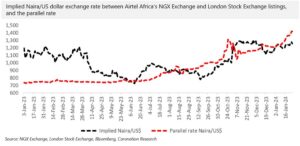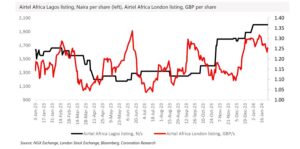…Buying Airtel Africa shares in Lagos and selling them in London is one way of realising foreign exchange.
WED, JAN 31 2024-theGBJournal| In the last three months of 2023 the NGX-Exchange listed shares of Airtel Africa rallied by 46.3% compared with a rally in the NGX All-Share Index of 12.6%.
Those familiar with the dual listing of Airtel Africa shares in Lagos and in London spotted a likely cause.
The Naira had weakened by 16.7% against the US dollar in the parallel market, and it was getting close to year-end.

Buying Airtel Africa shares in Lagos and selling them in London is one way of realising foreign exchange.
It is straightforward. An investor buys Airtel Africa shares in Lagos for Naira, has them canceled and reissued in London where they are sold for Pounds Sterling.
At year-end foreign companies frequently need to repatriate their US dollars from Nigeria. The result can be pressure on the parallel exchange rate (as was the case last year).
But not all companies tolerate using the swap structure of the parallel market: some prefer to use the dual-listing route because this gives them a counterparty in the form of a UK regulated stockbroker.
One would think that the supply of Airtel Africa shares listed in Nigeria would simply run out this way. However, when the Naira/US dollar exchange rate is much lower than that implied by the Airtel Africa foreign exchange transaction, shares flow into Nigeria.
For example, exactly a year ago, it was possible to buy Airtel Africa shares in London for GBP1.17/share, cancel them and reissue them in Nigeria, sell them for N1,660/share, and swap them back into US dollars at the parallel exchange rate of N752/US$1 and realise a 47% return in Pounds Sterling, allowing 10% for costs.
That caused the shares to flow back into Nigeria for a while.

For the past few months such transactions (either from London to Nigeria, or from Nigeria to London) have not yielded such arbitrage opportunities, because the implied exchange rate has been close to the parallel market rate.
Assuming this continues to be the case, then movements in the price of Nigerian Airtel Africa shares may be strongly influenced by the parallel exchange rate.
That, at least, would explain the continued appreciation of Airtel Africa shares which are up 6.0% this year.-With Coronation Research update note
X-@theGBJournal|Facebook-the Government and Business Journal|email:gbj@govbusinessjournal.com|govandbusinessj@gmail.com










